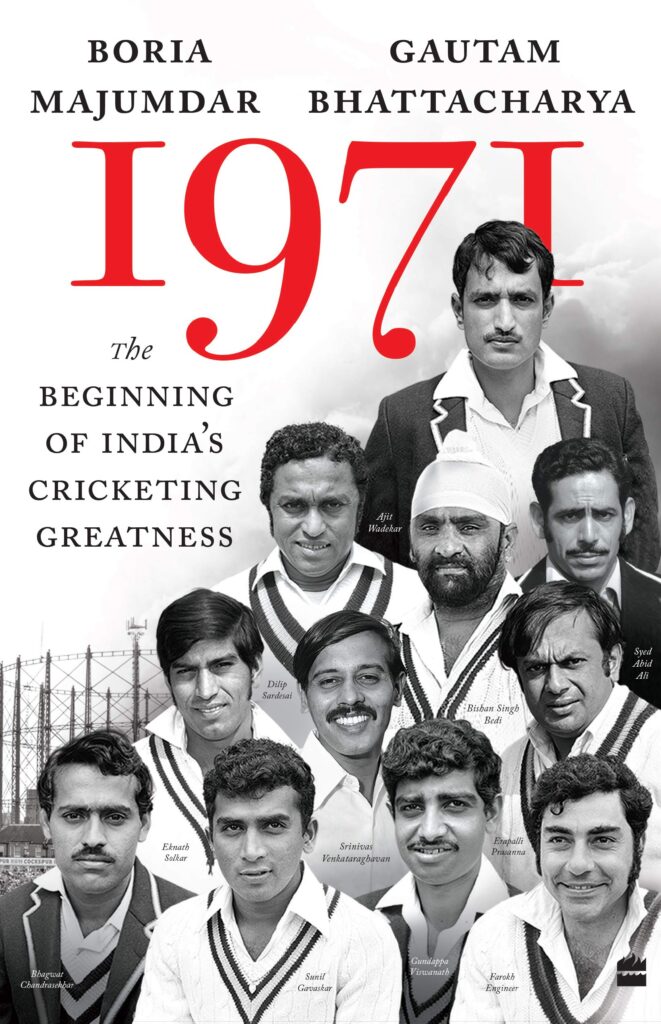
Amidst the gloom of the pandemic sports very often acts as a healer and lifts the mood of the nation bringing in the happiness all around. The highest ever medals tally in Indian Olympics journey at Tokyo 2020 with 7 medals is a case in point. It could not have come at a right time. The astonishing success has lifted the spirit and given hopes of a bright future of Indian sports. And good things will come soon.
It is not Tokyo 2020 that has brought smiles back. The smiles were in faces of all Indians fifty years ago too . As Boria Majumdar and Gautam Bhattacharya takes us down the memory lane with their magnum opus book – 1971 – The beginning Of India’s Cricketing Greatness. Cricket is like a religion in India and the players are literally demigods. And any story on cricket gives ardent fans of the game wanting to read more. And 1971 gives us just that .
And the year 1971 which changed Indian cricket forever with historic Test series wins In West Indies and England have been brought by the authors for the readers with lot of panache . It mesmerises all with never heard before anecdotes, off- pitch tales , selection woes. captaincy conundrum among others. Making it a riveting read from the start.
If one thought Ajit Wadekar became Captain in a smooth way. Then one is surely mistaken. Captaincy in Indian cricket is a hot seat next only to the Prime Minister . The book gives us behind the scene drama how Wadekar became Captain after Mansoor Ali Khan Pataudi was removed a skipper. The role of chairman of the selection committee Vijay Merchant .
Merchant in- fact made a gamble appointing Wadekar( many were apprehensive of the appointment) as skipper and how it proved to be a master stroke in the end with – Wadekar skippering both the Test winning sides in West Indies and England . The pressure on Wadekar was more since he replaced Mansoor Ali Khan Pataudi under whom India won their first away Test series In New Zealand 1967-68.
Pataudi as one learns from the book was peeved after losing his captaincy . The Pataudi- Merchant saga has been brought in public domain in Chapter 2 . Moreover, losing captaincy especially in Indian cricket as one observed over the years has not gone down well, It is not the case of Pataudi alone who felt bitter . Sourav Ganguly in 2005 was livid when he was removed as captain and replaced by Rahul Dravid. And there is the case of Gautam Gambhir how keen he was the lead the Indian cricket team. A wish that eventually remained unfulfilled .
The famous win in West Indies has been captured beautifully in Chapter 4, Triumph in Trinidad and the following one Chapter 5- Winning the series. It brought to the fore the how inspiring the words were from Dilip Sardesai regarding the strength of the West Indian team . A statement that would lift the morale of the team ultimately and make them believe they can go all the way.
Sardesai not only spoke but his bat also did the talking in the series ( 642 runs in the series) . He played a pivotal role and one of the architects of the famous win in the Caribbean . The hero of the series though was the debutant who would would in the later years earn the sobriquet ‘Little Master’ Sunil Manohar Gavaskar. What a series he had . 774 runs in his first series were simply astonishing . And there is palpable excitement in Gavaskar’s voice as he with Abid Ali for company had the great opportunity to hit the winning runs in Port Of Spain.
After the stunning win in West Indies, Ajit Wadekar’s men were ready for their next big challenge England . The selection though was not easy one . The chapter 6 – The Tumultous build up for England says it all. The inclusion of Farokh Engineer was hotly debated as he did not play much domestic cricket. But he proved to be an asset for the side – courtesy his batting and wicket- keeping abilities. He was not picked for the West indies tour and was not sure of his place in the England touring team till the last moment . But what a turn around, not only Engineer proved his doubters wrong but played a key role in India winning the historic match at The Oval, where he guided young Vishwanath and nearly took India home. With three runs to get , Viswanath ignored Engineer’s plea not to play rash shot. Viswanath went ahead and paid the price. A shot which he is candid enough to admit ( worst shot of his cricketing career) to the authors that it was wrong one and he still regrets and wonders why he played that needless shot. And it was left for Abid Ali to hit the winning runs to pave the way for the stunning win. The series also saw India spin quartet weave their magic – Bhagwat Chandrashekhar( 6/38 at The Oval ) along with Erapalli Prasanna, Srinivas Venkataraghavan and Bishan Singh Bedi.
All in all the book is well researched and engrossing conversations with the players who were part of the twin series makes it a engaging read. Yes , the book has come out at time when there is negativity all around . The authors mention the political rhetoric and the sliding economy . I would take a step further to say that political discourse now is at the lowest ebb. The Idea of India where there was liberty to engage, agree and disagree is now under serious threat with every contrary view seen as dissent and term- anti- national and sedition charges are slapped at will. This is a dangerous precedent and certainly not the India we want. So keeping fingers crossed for sanity to prevail in the years ahead.
Have read all of Boria’s books and one can surely say that with every book he seems to raise the bar. 1971 is yet another masterpiece from a prolific writer, who follows sports with great deal of zeal and passion. This is a must read for all who want know in every detail about the year in which Indian cricket made the world take notice . And there was no looking back from there on so far as Indian cricket is concerned. The rest they say is history.
[the_ad id=”41101″]


















